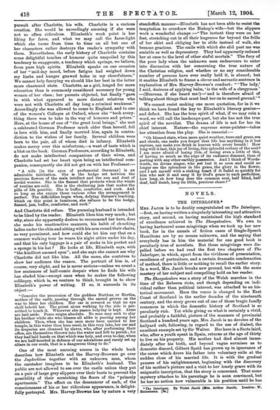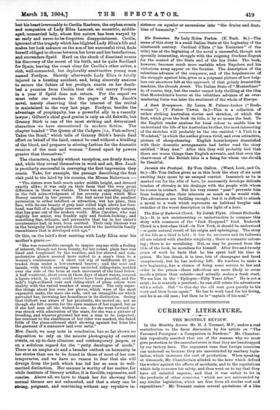THE INTERLOPER.*
MRS. JACOB is to be doubly congratulated on The Interloper, —first, on having written a singularly interesting and attractive story, and second, on having maintained the high standard of excellence achieved in The Sheepsteolers. We own to having harboured some misgivings when we took up her new book, for in the annals of fiction cases of Single-Speech Hamiltons are by no means unknown, and the saying that everybody has in him the material for one good book is peculiarly true of novelists. But these misgivings were dis- pelled before we had read the first two chapters of The Interloper, in which, apart from the vividness of presentation, excellence of portraiture, and a certain dramatic condensation of method, there is little or nothing to recall the earlier story. In a word, Mrs. Jacob breaks new ground, but with the same mastery of her subject and compelling hold on her reader.
The Sheepstealers was a story of the Welsh marches in the time of the Rebecca riots, and though depending on indi- vidual rather than political interest, was attached to an his- torical movement. Here the venue is changed to the East Coast of Scotland in the earlier decades of the nineteenth century, and the story grows out of one of those tragic family romances in which the domestic history of Scotland is so peculiarly rich. Yet while giving us what is certainly a vivid, and probably a faithful, picture of the manners of provincial Scotland a hundred years ago, Mrs. Jacob is no devotee of the kailyard cult, following, in regard to the use of dialect, the excellent example set by Sir Walter. Her hero is a Scots laird, who, after a youth spent in Spain, returns at the age of thirty to live on his property. His mother bad died almost imme- diately after his birth, and beyond vague surmises as to domestic discord, Gilbert Speid has grown up in ignorance of the cause which drove his father into voluntary exile at the sudden close of his married life. It is with the gradual process of his enlightenment, beginning with the discovery of his mother's picture and a visit to her lonely grave with its enigmatic inscription, that the story is concerned. That some mystery attaches to his parentage he is soon convinced, but he has no notion how vulnerable is his position until he has
an early and never-to-be-forgotten disappointment Cecilia, ignorant of the tragedy which has blighted Lady Eliza's life and makes her look askance on the son of her successful rival, finds herself obliged to choose between her lover and her benefactress, and surrenders Speid. Hard on the shock of dismissal comes his discovery of the secret of his birth, and he quits Scotland for Spain, leaving the coast clear for Cecilia's other suitor, a rich, well-connected, but deplorably unattractive young man named Fordyce. Shortly afterwards Lady Eliza is fatally injured in a hunting accident, and, being sincerely anxious to secure the future of her protegee, exacts on her death- bed a promise from Cecilia that she will marry Fordyce in a year if Speid does not return. For the sequel we must refer our readers to the pages of Mrs. Jacob's
novel, merely observing that the interest of the recital is maintained to the very last page. Fordyce, besides the advantage of propinquity, has a powerful ally in a rascally
lawyer ; Gilbert's chief good genius is only an old fishwife, but Granny Stirk is one of the most striking and determined characters we have encountered in modern fiction. The chapter beaded "The Queen of the Cadgers [i.e., Fish-sellers] Takes the Road," which tells of Granny Stirk's heroic final
effort on behalf of the laird, cannot be read without a kindling of the blood, and prepares in stirring fashion for the dramatic reunion of the man and woman "forced apart by powers greater than themselves."
The characters, hardly without exception, are firmly drawn, and, while they reveal themselves in word and act, Mrs. Jacob is peculiarly successful in conveying the first impression they create. Take, for example, the passage describing the first
visit paid to the laird by his cousins, the Misses Robertson :— "The sisters were both much under middle height, and dressed exactly alike; it was only on their faces that the very great difference in them was visible. There was an appealing dignity in the full acknowledgment of her seventy years which Miss Hersey carried in her person. She had never had the smallest pretension to either intellect or attraction, but her plain, thin face, with its one beauty of gray hair rolled high above her fore- head, was full of a dignity innocent, remote, and entirely natural, that has gone out of the modern world. Miss Caroline, who was slightly her senior, was frankly ugly and foolish-looking ; and something fine, delicate, and persuasive that lay in her sister's countenance had, in hers, been omitted. Their only likeness was in the benignity that pervaded them and in the inevitable family resemblance that is developed with age."
Or this, on the laird's first meeting with Lady Eliza near his mother's grave :—
"She was remarkable enough to inspire anyone with a feeling of interest, though not from beauty, for her round, plain face was lined and toughened by the weather, and her shrewd and com- prehensive glance seemed more suited to a man's than to a woman's countenance. A short red wig of indifferent fit pro- truded from under a low-crowned beaver ; and the cord and tassels, with which existing taste encircled riding-hats, nodded over one side of the brim at each movement of the head below. A buff waistcoat, short even in those days of short waists, covered a figure which in youth could never have been graceful, and the lady's high-collared coat and riding-skirt of plum colour were shabby with the varied weather of many years. The only super- fine things about her were her gloves, which were of the most expensive make, the mare she rode, and an intangible air which pervaded her, drowning her homeliness in its distinction. Seeing that Gilbert was aware of her proximity, she moved on; not as though she felt concern for the open manner of her regard, but as if she had seen all she wished to see. As she went forward he was struck with admiration of the mare, for she was a picture of breeding, and whoever groomed her was a man to be respected ; her contrast to the shabbiness of her rider was marked, the faded folds of the plum-coloured skirt showing against her loins like the garment of a scarecrow laid over satin."
Mrs. Jacob, we may note in conclusion, has so far shown no
disposition to rely on the minute photography of current events, on up-to-date allusions and contemporary jargon, or on a sedulous regard for the "petty decalogue of mode."
There is an ampler air and a broader outlook on humanity in her stories than are to be found in those of most of her con- temporaries, and we have no reason to fear that she will diverge from the path which has led her so soon to well- merited distinction. Her manner is worthy of her matter, for while destitute of literary artifice, it is forcible, expressive, and concise. Above all, we have to thank her for showing that
normal themes are not exhausted, and that a story can be strong, poignant, and convincing without any repulsive in-











































 Previous page
Previous page